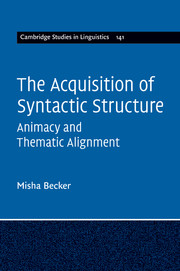Book contents
- Frontmatter
- Contents
- List of figures
- List of tables
- Acknowledgements
- 1 Introduction
- 2 The syntax of displacing and non-displacing predicates
- 3 Argument hierarchies
- 4 Animacy and adult sentence processing
- 5 Animacy and children's language
- 6 Modeling the acquisition of displacing predicates
- 7 Conclusion and origins
- Appendix
- Bibliography
- Index
7 - Conclusion and origins
Published online by Cambridge University Press: 05 July 2014
- Frontmatter
- Contents
- List of figures
- List of tables
- Acknowledgements
- 1 Introduction
- 2 The syntax of displacing and non-displacing predicates
- 3 Argument hierarchies
- 4 Animacy and adult sentence processing
- 5 Animacy and children's language
- 6 Modeling the acquisition of displacing predicates
- 7 Conclusion and origins
- Appendix
- Bibliography
- Index
Summary
The end of this book is about beginnings. What is the nature of children's prior knowledge that allows them to understand “true grammatical relations” that are “not expressed directly on [the] surface” form of a sentence – that is, to acquire the correct internal structure of opaque constructions? I have argued that hearing a main predicate used with an inanimate subject is one important clue to this puzzle. As spelled out in the Derived Subject Condition (Section 3.5), if the subject is the least animate NP in the sentence (it has the fewest Proto-agent entailments or the most Proto-patient entailments, in Dowty's terms), it is likely to be derived. Therefore, this clue allows children to figure out that the predicate most likely permits a syntactic subject that is not a semantic subject, or external argument.
Hearing an inanimate subject is evidence that comes from the input, but in Chapter 6 I argued that the learner required inductive biases in order to generalize, and the learning models we employed in Section 6.3 used language-specific biases to solve the generalization problem: specifically, the assumption that subjects would be animate some proportion of the time, and that predicates could be more or less selective about the animacy of their subject. In this chapter I want to look a little more closely at the issue of innateness, and what arguments might be made for these biases being a type of innate knowledge in language learners.
- Type
- Chapter
- Information
- The Acquisition of Syntactic StructureAnimacy and Thematic Alignment, pp. 283 - 297Publisher: Cambridge University PressPrint publication year: 2014



